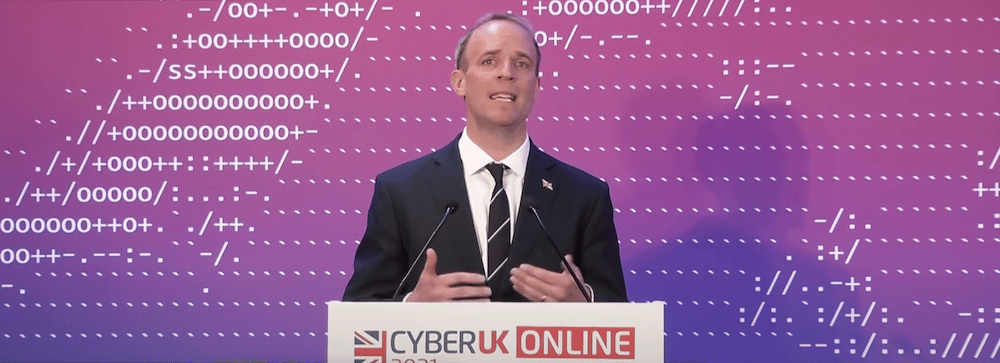This year’s CYBERUK event ran across two days in a new format as CYBERUK ONLINE via a dedicated YouTube channel with a mix of live keynotes and panels, as well as a selection of pre-recorded content from the NCSC and sponsors for users to watch in their own time.
Alongside the interactive demos and workshop sessions, the Foreign Secretary, Dominic Raab, outlined crucial cyber issues in his keynote speech, which included the recent ransomware attacks against the NHS, the concerns around Russia sheltering online actors and the UK’s issuing of £22 million to support cyber capacity across the globe.
Raab began by pointing out: “On this day, four years ago, computers across the NHS suddenly flashed up a red screen. With an image of a padlock and the words: ‘oops, your files have been encrypted.’
“There was a demand for a bitcoin payment, and two countdown clocks. One for when the ransom demand would be doubled, and another for when the files would be permanently destroyed.
“Staff were locked out of the computers they use to access records and book appointments. They couldn’t operate MRI scanners, blood-storage fridges, and even operating theatre equipment were knocked out. At what point do we wake up and realise that online is a major part of the real world that we live in? And that’s why it’s so vital that we adapt.”
The Foreign Secretary continued to point out that according to Harvard’s Belfer Centre, the UK is already a top three cyber power, alongside the US and Chine. He continued to say: “…there is a common misconception that cyber power is all about people like Q in a bunker somewhere, coming up with the gizmos of the future. The reality is that it is much broader than that.
“Sure, we need coders and computer scientists if we are to succeed. But we also need a broader alliance of people involved including teachers and researchers, businessmen and women, and diplomats who understand how to make the best of the power of new technology.”
Hostile state actors and criminal gangs want to undermine the foundations of society and democracy, Raab said. There is a clash between authoritarian and democratic states playing out in cyber-space at the moment, he added, with malicious cyber-actors the “industrial-scale vandals of the 21st century.”
He warned that cyber-attacks pose a real risk on a daily basis, with states using digital technology to sabotage and steal. But criminal ransomware, in which people’s data is held hostage until a payment is made, has also been of growing concern. A spate of ransomware attacks has hit companies and organisations.
Those educational institutions hit by ransomware earlier this year – affecting their ability to return to in-person teaching – included schools, colleges and universities, the foreign secretary said. The NCSC has already issued a series of alerts on the issue.
Raab then called on Russia to take action and described a “marathon” and a “war of attrition” to deal with hostile activity and said the UK would keep shining a light on predatory activities. “By revealing the tools and techniques that malicious cyber actors are using, we can help our citizens and businesses to see the signs and that will help them protect themselves from the threats.”
Finally, the foreign secretary was pleased to announce £22m in new funding would go to support cyber capacity building in other countries – including working with Interpol to set up a cyber-operations hub in Africa.
He said, “the idea of that will be to improve co-operation on cybercrime investigations, and support the countries involved to mount joint operations. So my perspective, at least from a diplomatic point of view, is that as Global Britain we must be agile and work with new partners.”
Raab concluded his keynote speech by remaining optimistic about what lies ahead for UK cybersecurity. “We can lead internationally in protecting the most vulnerable countries, and at the same time bring together a wider coalition of countries to shape international rules that serve the common good.
“Britain has a real comparative advantage in this space, and we’ve got the world-beating coders and scientists, the Ground-breaking innovators. At the same time, from GCHQ to the NCSC to the National Cyber Force, we have the capacity to defend our liberties at home and protect the world’s online freedoms from those who would poison the well.
“And that’s our mission as Global Britain, to flourish as a tech superpower and to serve as an even stronger force for good in the world.”






